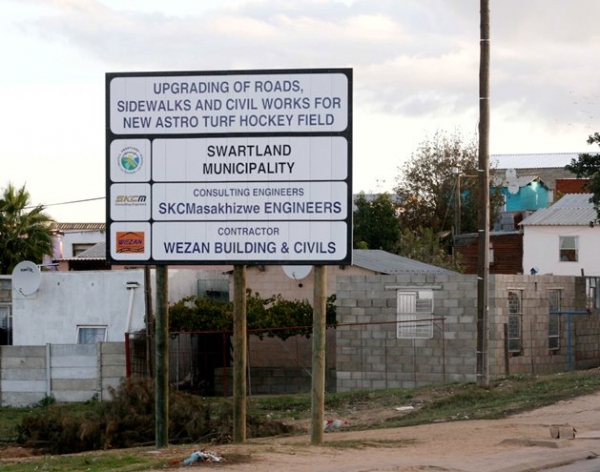

Signs such as this one have been erected around Malmesbury.
17 June 2015
A new hockey astro facility funded with a R3 million grant from the Western Cape Provincial Sport Confederation to the Swartland Municipality has raised to questions in the community about how resources are allocated.
Further questions have arisen over the fact that one of the key players in the development of the new facility, the municipal manager of Swartland Municipality, Joggie Scholtz, was also the chairman of the governing body of Swartland High School, where the facility is to be built, when the grant was awarded.
Scholtz has defended his involvement. He says he declared his role and position to both the school and the municipality early on in the grant application process.
“The facility is a community facility but the school has also made a comprehensive contribution. The school will manage the facility and welcomes the use of the facility by various other stakeholders,” said Scholtz.
Lyndon Bouah, chief director of sport and recreation in the Western Cape, also defended the project.
“There is no astro facility anywhere on the West Coast and the idea of the partners [the Western Cape Government, the Western Cape Provincial Sport Confederation, the Swartland Municipality and the Swartland High School] building a facility is to ensure that the whole community has access to the sport of hockey,” said Bouah.
The facility has been in the pipeline since 2011 and the school approached a number of potential donors to fund it. The Swartland High School’s hockey committee proposal outlines three objectives: to establish a synthetic hockey field of good quality; to promote hockey in general in the community; to introduce hockey to the previously disadvantaged schools.
Professional hockey players as well as provincial teams in South Africa all play on artificial surfaces and according to the school’s hockey committee, the lack of such a facility is a disadvantage to all players in the community.
About half the schools in the West Coast Education District play hockey, but four of the six hockey-playing schools have school fees amounting to more than R7,000 per year. Out of the seven schools in the district that do not play hockey, six of them have school fees that amount to less than R1,000. This indicates that it is the poorer schools in the community that are not playing hockey.
Swartland High School proposes that they will introduce non-hockey playing schools to hockey via a six-week in season hockey coaching programme. They state that the implementation period will take three to five years depending on sponsorships.
Chairperson of the Western Cape Provincial Sport Confederation (WCPSC) Goliath Munro said that he is holding the Swartland Municipality accountable to ensure that the facility is used by the community.
“The reason for using the Swartland High School’s premises is purely for security reasons. The school and the local municipality will be responsible for the maintenance of the turf,” said Munro.
Dirk Marais who is the principal of Swartland High School referred queries to Gert van Staden, who is involved in the project and is on the school’s governing body this year. Van Staden said that while the astro turf is being built on the school’s premises and will be used by the school, it is also available for use by the public. He said that schools in the larger Swartland community will be able to book sessions on the field and that the development of the facility is much needed.
“Being an area like Swartland we haven’t got the funds. We have gone through all sorts of applications and processes [to raise funds],” said Van Staden.
Scholtz and the school principal have a strained history. In February, Marais took out a protection order against Scholtz after Scholtz apparently sent threatening smses and emails to Marais. The protection order has since been removed but the situation remains tense.